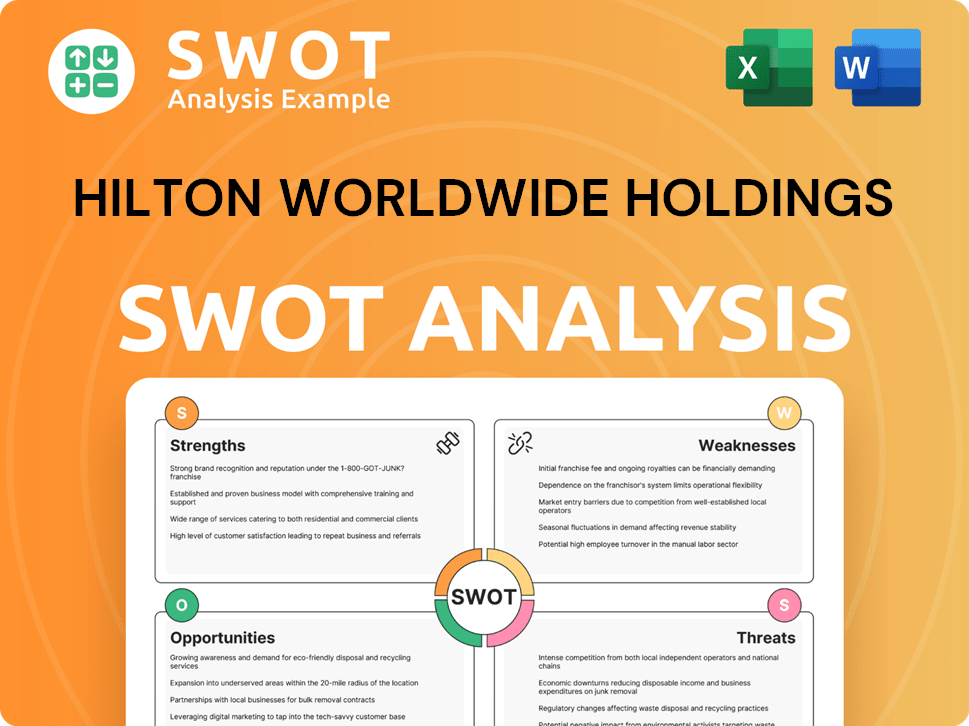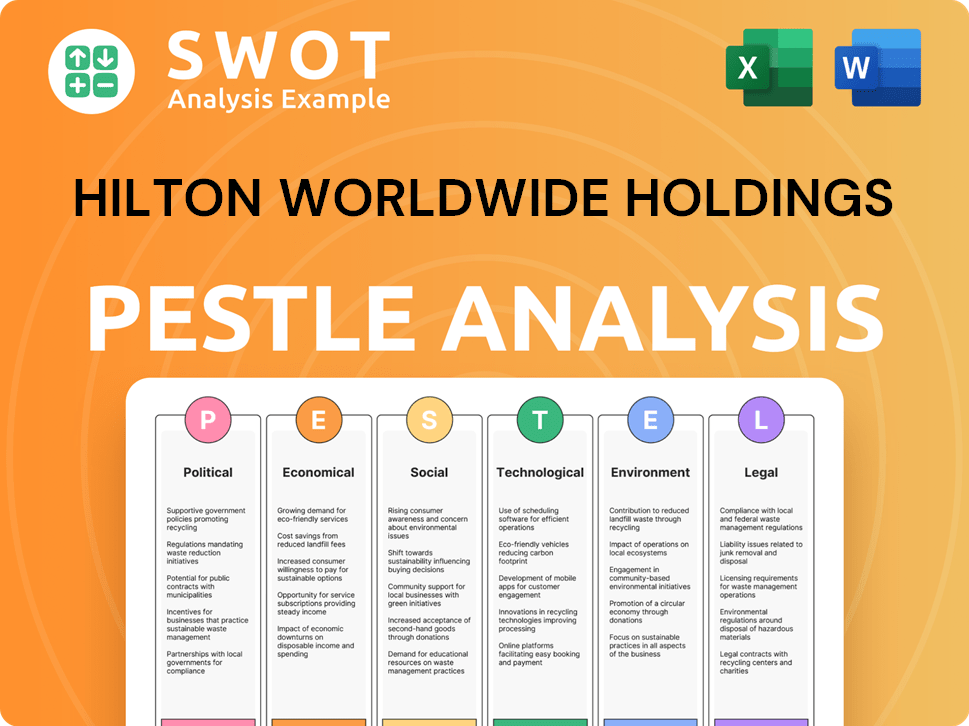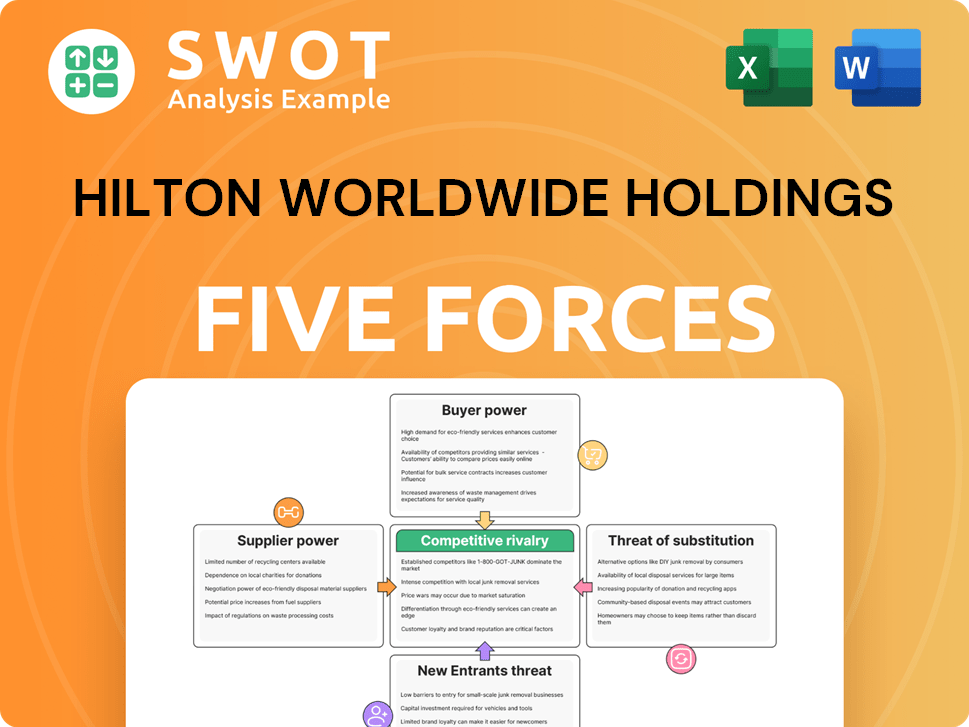Hilton Worldwide Holdings Bundle
Who Really Owns Hilton Worldwide Holdings Company?
Unraveling the ownership structure of Hilton Worldwide Holdings Company is key to understanding its global footprint and strategic maneuvers. From its humble beginnings to its current status as a hospitality behemoth, Hilton's ownership journey has been marked by significant shifts, including a pivotal acquisition by Blackstone Group. Understanding the current ownership landscape provides crucial insights for investors and industry watchers alike.

Founded by Conrad Hilton, the company has evolved dramatically, now boasting thousands of Hilton Worldwide Holdings SWOT Analysis properties worldwide. Knowing who controls this massive network is vital for anyone interested in the hospitality sector. This exploration will uncover the key players shaping Hilton's future, from major institutional investors to the influence of public shareholders. Discover the intricacies of Hilton's ownership and its impact on the company's performance and strategy.
Who Founded Hilton Worldwide Holdings?
The story of Hilton Worldwide Holdings Company begins with Conrad Hilton, who established the foundation for what would become a global hospitality giant. His initial investment in 1919, the Mobley Hotel, marked the start of his journey in the hotel industry.
Conrad Hilton's vision drove the early expansion of the company. The opening of the Dallas Hilton in 1925 was a crucial step, as it was the first hotel to bear the Hilton name. The company's growth continued with strategic acquisitions and management agreements.
While the exact details of the early ownership structure are not fully available, Conrad Hilton's role as the driving force behind the company's growth is undeniable. His leadership was key in shaping the company's trajectory, from its early days to its expansion into international markets.
In 1919, Conrad Hilton purchased the Mobley Hotel in Cisco, Texas, for $5,000, marking his entry into the hotel business.
The Dallas Hilton, which opened in 1925, was the first hotel to be branded with the Hilton name.
Hilton became the first hotel company listed on the New York Stock Exchange in 1943.
In 1954, Hilton International was established to manage hotels outside the United States.
Conrad Hilton remained the leader of the company until his death in 1979.
The Conrad Hotels brand was created to honor Conrad Hilton's contributions.
The early ownership of Hilton was primarily driven by Conrad Hilton's vision and investment. He expanded the company through strategic acquisitions and management agreements. The company's listing on the New York Stock Exchange in 1943 was a significant event in its ownership history, allowing for broader investment. Today, understanding the target market of Hilton Worldwide Holdings is crucial for investors.
- Conrad Hilton purchased the Mobley Hotel in 1919, starting the company.
- The Dallas Hilton, the first hotel with the Hilton name, opened in 1925.
- Hilton International was formed in 1954 to manage hotels outside the U.S.
- Conrad Hilton led the company until his death in 1979.
Hilton Worldwide Holdings SWOT Analysis
- Complete SWOT Breakdown
- Fully Customizable
- Editable in Excel & Word
- Professional Formatting
- Investor-Ready Format

How Has Hilton Worldwide Holdings’s Ownership Changed Over Time?
The ownership of Hilton Worldwide Holdings Company has seen significant shifts over time. Initially, the company was taken private in 2007 by Blackstone Group through a $26 billion deal. This marked a major change from its public status, which had been in place since 1943. The company returned to the public market in 2013 with an IPO on the New York Stock Exchange (NYSE) under the ticker 'HLT'.
Following the IPO, Blackstone initially maintained a controlling stake, but by mid-2018, it had fully exited its position, making Hilton a fully independent publicly traded company. In 2016, China's HNA Group acquired a 25% equity interest, and by March 2017, HNA Group, Blackstone, and Wellington Management Company were among the largest shareholders. The spin-offs of Park Hotels & Resorts and Hilton Grand Vacations also impacted the ownership structure in January 2017.
| Year | Event | Impact on Ownership |
|---|---|---|
| 2007 | Blackstone Group acquisition | Took Hilton private |
| 2013 | IPO | Returned Hilton to public trading |
| 2016-2018 | Blackstone's exit, HNA Group investment | Shift to broader institutional ownership |
As of May 2025, institutional investors hold a substantial majority of Hilton's shares. According to Fintel, there are 1,973 institutional owners, collectively holding 288,855,906 shares. Institutional ownership ranges from approximately 59.14% to 98.52% as of Q1 2025 and May 2025. Major shareholders include Vanguard Group Inc., BlackRock, Inc., and State Street Corp. Vanguard alone owns a significant 9.54% of shares, equivalent to 22,680,802 shares. Insiders held about 0.21% of shares in May 2025, a slight increase from 0.20% in March 2025. Retail investors and public companies hold the remaining shares. These shifts highlight the influence of institutional investors on company strategy. For more insights, check out the Growth Strategy of Hilton Worldwide Holdings.
Hilton's ownership has evolved from private equity control to significant institutional ownership.
- Blackstone's acquisition and subsequent exit were pivotal.
- Institutional investors now dominate the shareholder base.
- Understanding the ownership structure is crucial for investors.
- Major shareholders influence the company's strategic direction.
Hilton Worldwide Holdings PESTLE Analysis
- Covers All 6 PESTLE Categories
- No Research Needed – Save Hours of Work
- Built by Experts, Trusted by Consultants
- Instant Download, Ready to Use
- 100% Editable, Fully Customizable

Who Sits on Hilton Worldwide Holdings’s Board?
The current Board of Directors of Hilton Worldwide Holdings Company plays a vital role in the company's governance. The board includes a mix of major shareholders, and independent voices. Jonathan D. Gray serves as the Non-Executive Chairman, and Christopher J. Nassetta is the President and Chief Executive Officer. Other key members include Douglas Steenland (Lead Independent Director), Raymond Mabus (Independent Director), and Charlene Begley (Independent Director). As of March 2025, Judith McHale, a long-time director, announced her retirement, with Marissa Mayer nominated for election at the Annual Meeting of Shareholders in May 2025. Mayer's nomination brings expertise in consumer and technology to the board.
The board's composition reflects the company's focus on experienced leadership and independent oversight. The presence of independent directors ensures a balance of perspectives. The upcoming addition of Marissa Mayer highlights the company's commitment to adapting to evolving market dynamics. Understanding Hilton ownership is key to understanding its strategic direction. The structure of the board is designed to guide the company's long-term success. This structure is crucial for the company's operations and its ability to navigate the competitive landscape of the hotel industry. The board's decisions directly impact the management of Hilton hotels and its diverse portfolio of Hilton brands.
| Board Member | Title | Key Role |
|---|---|---|
| Jonathan D. Gray | Non-Executive Chairman | Oversees the board and strategic direction. |
| Christopher J. Nassetta | President and CEO | Leads the company's operations and strategy. |
| Douglas Steenland | Lead Independent Director | Provides independent oversight and leadership. |
| Raymond Mabus | Independent Director | Offers independent perspectives and guidance. |
Regarding voting structure, holders of Hilton's common stock are entitled to one vote for each share held. This applies to all matters, including the election or removal of directors. The company does not have cumulative voting rights. In uncontested elections, stockholders holding a majority of the voting power can elect all directors. Special meetings of stockholders can be called by the Board, the Chairman, the CEO, or upon the request of holders of at least a majority of the total voting power. The company's Certificate of Incorporation states that the board can make, alter, or repeal the By-Laws. Stockholders can amend By-Laws only with the approval of 80% or more of all outstanding shares entitled to vote. For more information, you can also review the Competitors Landscape of Hilton Worldwide Holdings.
Understanding the voting structure is key to understanding Hilton ownership. Stockholders have one vote per share, and the majority can elect directors. Special meetings can be called by the board or shareholders.
- One vote per share for common stock holders.
- No cumulative voting rights.
- Board can amend By-Laws.
- Shareholders can amend By-Laws with 80% approval.
Hilton Worldwide Holdings Business Model Canvas
- Complete 9-Block Business Model Canvas
- Effortlessly Communicate Your Business Strategy
- Investor-Ready BMC Format
- 100% Editable and Customizable
- Clear and Structured Layout

What Recent Changes Have Shaped Hilton Worldwide Holdings’s Ownership Landscape?
Over the past few years, Hilton Worldwide Holdings Company has actively returned capital to its shareholders. For the full year 2024, the company returned $3 billion to shareholders through buybacks and dividends. The first quarter of 2025 saw the authorization of a quarterly cash dividend of $0.15 per share. For the full year 2025, Hilton anticipates returning approximately $3.3 billion to shareholders via share buybacks and dividends. The company repurchased 3.1 million shares for $744 million in the fourth quarter of 2024 and a total of 13.3 million shares for $3.0 billion throughout 2024. As of March 31, 2025, Hilton had $875 million worth of share buybacks, marking a 31.38% increase compared to the same period last year. In November 2024, the board approved an additional $3.5 billion for share repurchases, bringing the total authorized amount for future repurchases to approximately $4.8 billion.
In terms of leadership changes, Michael W. Duffy, Senior Vice President, Chief Accounting and Risk Officer, resigned, effective February 7, 2025. Misha Moylan, the current Senior Vice President of Internal Audit and Enterprise Risk Management, will succeed him as Senior Vice President, Chief Accounting Officer. These developments reflect ongoing adjustments within the company's financial leadership structure.
| Metric | Value | Year |
|---|---|---|
| Share Repurchases (Q4) | $744 million | 2024 |
| Share Repurchases (Full Year) | $3.0 billion | 2024 |
| Share Buybacks (as of March 31) | $875 million | 2025 |
| Institutional Ownership | 98.52% | May 2025 |
Industry trends show a continued increase in institutional ownership of Hilton. As of May 2025, institutional investors held 98.52% of Hilton's shares. This high level of institutional ownership often indicates strong confidence from significant financial organizations. Hilton has also been focused on growth and expansion, achieving a record net unit growth of 7.3% in 2024 and anticipating 6.0% to 7.0% net unit growth in 2025. This growth strategy is supported by strategic partnerships and acquisitions, such as the exclusive partnership with Small Luxury Hotels of the World announced in February 2024, and the acquisition of a majority controlling interest in Sydell Group (owner of NoMad Hotels) in April 2024, all aimed at expanding its luxury lifestyle brand.
Hilton's ownership structure is heavily influenced by institutional investors. The company's focus on shareholder returns is evident through its share buyback programs and dividend payments. These actions reflect a commitment to enhancing shareholder value and confidence in the company's financial health.
The company's financial strategy includes significant capital returns to shareholders. Strong unit growth, strategic partnerships, and acquisitions are key aspects of Hilton's growth strategy. These initiatives are designed to enhance its presence in the luxury market.
Hilton is expanding its luxury lifestyle brand through strategic acquisitions. The company achieved a record net unit growth of 7.3% in 2024. These strategic moves aim to strengthen Hilton's market position and increase its brand portfolio.
Leadership transitions, such as the change in the Chief Accounting Officer role, are part of ongoing adjustments. These changes ensure the company remains agile in the face of market dynamics. The company's commitment to shareholder value is reinforced by its buyback and dividend strategy.
Hilton Worldwide Holdings Porter's Five Forces Analysis
- Covers All 5 Competitive Forces in Detail
- Structured for Consultants, Students, and Founders
- 100% Editable in Microsoft Word & Excel
- Instant Digital Download – Use Immediately
- Compatible with Mac & PC – Fully Unlocked

Related Blogs
- What are Mission Vision & Core Values of Hilton Worldwide Holdings Company?
- What is Competitive Landscape of Hilton Worldwide Holdings Company?
- What is Growth Strategy and Future Prospects of Hilton Worldwide Holdings Company?
- How Does Hilton Worldwide Holdings Company Work?
- What is Sales and Marketing Strategy of Hilton Worldwide Holdings Company?
- What is Brief History of Hilton Worldwide Holdings Company?
- What is Customer Demographics and Target Market of Hilton Worldwide Holdings Company?
Disclaimer
All information, articles, and product details provided on this website are for general informational and educational purposes only. We do not claim any ownership over, nor do we intend to infringe upon, any trademarks, copyrights, logos, brand names, or other intellectual property mentioned or depicted on this site. Such intellectual property remains the property of its respective owners, and any references here are made solely for identification or informational purposes, without implying any affiliation, endorsement, or partnership.
We make no representations or warranties, express or implied, regarding the accuracy, completeness, or suitability of any content or products presented. Nothing on this website should be construed as legal, tax, investment, financial, medical, or other professional advice. In addition, no part of this site—including articles or product references—constitutes a solicitation, recommendation, endorsement, advertisement, or offer to buy or sell any securities, franchises, or other financial instruments, particularly in jurisdictions where such activity would be unlawful.
All content is of a general nature and may not address the specific circumstances of any individual or entity. It is not a substitute for professional advice or services. Any actions you take based on the information provided here are strictly at your own risk. You accept full responsibility for any decisions or outcomes arising from your use of this website and agree to release us from any liability in connection with your use of, or reliance upon, the content or products found herein.